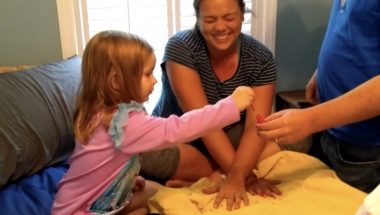Appreciating the Spunk and Optimism of a 7-year-Old
Columnist Helen Baldwin marvels at children's resilience in the face of adversity
Written by |

“I haven’t had cancer since I was 11 months old!” our cheery granddaughter recently proclaimed. Clara turned 7 at the end of December. She’s witty, imaginative, spunky, highly entertaining, candid, cute, and sharp.
Sometimes, though, her facts are a bit skewed. She’s never had cancer.
What she does have is Beckwith-Wiedemann syndrome (BWS). Characteristics of BWS include hemihypertrophy (overgrowth of one side of the body) and an increased risk of childhood cancers, primarily hepatoblastoma (liver) and Wilms tumor (kidney). BWS babies with severe tongue overgrowth undergo tongue reductions. Additional surgical procedures may correct omphaloceles (abdominal wall defects) and substantial leg length discrepancies.
At 10 months, Clara played in a bouncy seat at the babysitter’s house. The alert sitter noticed that her left leg was considerably chunkier than her right. Clara’s attentive folks and I were mortified that we hadn’t noticed it ourselves, given the collective diaper changes, baths, and cuddling. Her perpetually cheery, animated face had apparently kept us focused higher up.
Clara’s parents, Matthew and Jill, scoured the internet for possible causes. I vividly remember Jill telling me, “I think she has BWS, which has an increased risk of childhood cancer.”
I remember telling her to stop Googling.
A whopper of a midlife surprise, then a real whammy
My husband, Randy, and I just celebrated 27 years in our old farmhouse in North Carolina. We’ve squeezed a lot into that time: a family lodge on the Blue Ridge Parkway, flying squirrels in the dining room, a blizzard, frozen plumbing, football coaching, “retirement,” beekeeping, and gobs more. We’ve watched our children grow up and establish their own families and dreams. Randy and I have lost our three remaining parents and various other loved ones during our time here. With the exception of perhaps the flying squirrels, it’s been fairly typical life stuff.
We’ve also had a dose of not-so-typical life stuff.
A surprise third pregnancy in 1997 brought us a sweet bonus baby. Jeffrey was beautiful like his older siblings, Matthew and Katie, and his quiet, content demeanor was perfectly suited for his rapidly aging parents. He fit right in with only an occasional whimper.
The midlife pregnancy wasn’t the only surprise. When Jeffrey was 2 months old, we learned that his easy existence was about to end. And so was his earthly stay.
The pediatric neurologist informed us that Jeffrey had a severe case of the most severe form of spinal muscular atrophy, or SMA. There was no treatment or cure, he added.
He wasn’t finished dealing blows. “Most are gone by their fourth birthday.”
Facing adversity with the fortitude of a child
Matthew and Katie, then 10 and 7, respectively, were waiting at home with my folks when Randy and I returned from our fateful trip. Upon hearing, “Something dug Duffy up,” Randy promptly tackled reburying our dog, who had been hit by a car the previous week.
Alone by default, I explained a little about our new assignment to my captive audience, scrounging up as much optimism as my exhausted, shell-shocked self could muster. I didn’t realize until later that my doctor brother, Paul, who had briefly examined Jeffrey two days before, had alerted our folks to the suspected diagnosis. Their composure was impressive as I assured them that we’d do everything we could to help Jeffrey with whatever he needed.
I may have left out the part that he probably wouldn’t be with us for long.
In the days and months that followed, Matthew managed to (mostly) maintain his quiet, conscientious tendencies, always genuinely relieved after school to hear that Jeffrey had a good day. Katie’s 7-year-old self (mostly) maintained her bubbly, witty spunk, equally glad to hear her favorite baby brother had a good day, but also incredulous that he could have had any other kind. She handily explained SMA to the school counselor.
Oh, to be 7 in the face of a Goliath challenge — one that likely wasn’t going to end well.
Another surprise rare disease
After our unexpected introduction to SMA, no one expected a different, rarer disease to barge into our family 18 years later. Clara’s BWS diagnosis around 11 months called for a regular schedule of cancer screenings at St. Jude Children’s Research Hospital: blood tests to check her alpha-fetoprotein levels (or AFP, a tumor marker) every six weeks until she was 4, and ultrasound scans (primarily kidney) every three months until she turns 8. She has been a trooper and delights everyone.
We were somewhat relieved after learning more about BWS. If we had to deal with genetic adversity again, BWS (in its mild form, anyway) wasn’t so bad. It was fixable, and the rigorous monitoring routine would eventually end, albeit way down the road — unlike SMA.
We’re grateful Clara’s case is considered mild.
Unbelievably, the AFP checks ended three years ago, and our warrior princess is a mere three or four ultrasound scans away from routine annual checkups.
Blink, blink.
Peas in a proverbial pod
Clara and her Aunt Katie enjoy a boisterous time when they get together. If these two adversity champs were both 7 years old, they’d surely be BFFs.
And that image makes me smile.

Aunt Katie and Clara enjoy a nail-painting session in 2019, still a Clara favorite. (Photo by Helen Baldwin)
Note: SMA News Today is strictly a news and information website about the disease. It does not provide medical advice, diagnosis, or treatment. This content is not intended to be a substitute for professional medical advice, diagnosis, or treatment. Always seek the advice of your physician or other qualified health provider with any questions you may have regarding a medical condition. Never disregard professional medical advice or delay in seeking it because of something you have read on this website. The opinions expressed in this column are not those of SMA News Today or its parent company, Bionews, and are intended to spark discussion about issues pertaining to spinal muscular atrophy.





Leave a comment
Fill in the required fields to post. Your email address will not be published.